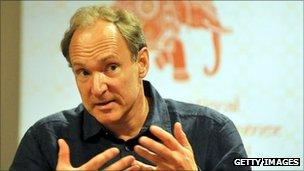Sir Tim Berners-Lee: 'Take to streets' over web plans
- Published

Sir Tim said storing information on people could be dangerous
World wide web founder Sir Tim Berners-Lee has said it will be necessary to protest "in the streets" against plans to increase internet monitoring.
Sir Tim told the BBC he was worried there would not be "much control" of the way information was used.
The government has not published its full proposals but says they simply extend existing rules to cover internet phone services and social media.
But Sir Tim said the plans were a "slippery slope".
The Home Office says the proposals are aimed at tackling crime and terrorism and they are expected to be outlined in full in the Queen's Speech in May.
'Very powerful'
It is thought that the plan is for internet firms to record details of internet use and be required to give intelligence agency GCHQ "real-time" access to emails, calls and messages.
Without a warrant they would not be able to see the content of the messages - but would be able to identify who someone was in contact with, how often and for how long, and which websites they had visited.
But Sir Tim, who has advised the government on making data more accessible, said: "It's the balance between respect for human beings and the powers the government's giving itself.
"The worry is that this information is very powerful information because it's such intimate information."
Sir Tim added that it could be recorded and kept, and there "might not be very much control over how it's used", adding: "I think it's a slippery slope."
'Waving banners'
He predicted a "battle" with the government over the issue, saying: "We need to fall back on the principle that the government doesn't have the right to intrude on individual people in their homes and look at what they are doing.
"It's really important for people who use the internet not to take it for granted.
"It's worth going online and making sure you talk to your MP, talk to your friends and make sure they're aware of this concern and, if necessary, get out there in the streets, waving banners.
"Unless [the plans are] significantly altered to preserve the rights of the citizen, I think it will be necessary to protest."
The government has not yet published a bill, but ministers have talked about the plans, which first emerged in a story in the Sunday Times.
Prime Minister David Cameron said last week that there was no question of "changing the rules and snooping into the content of somebody's telephone calls or emails".
He said a warrant would still be needed, signed by the home secretary - something that is currently the case for intelligence officers who want to listen to someone's phone call.
Mr Cameron denied it was a "snoopers' charter" and said the aim was to make sure the government was "keeping up with technology" - particularly as more communication was now being done through internet services like Skype.
But civil liberties groups have been critical as have some Conservative MPs. Former shadow home secretary David Davis has called it "an unnecessary extension of the ability of the state to snoop on ordinary people".
- Published18 April 2012
- Published10 April 2012
- Published8 April 2012
- Published4 April 2012